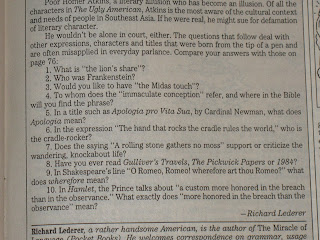Considering how tiny my apartment is, it's amazing how much stuff is in here. But there is a little less each day as I go through more of my possessions and realize, "Hey, I don't need this." Anyway, I was going through yet more old magazines and of course came across some Shakespeare references, which I feel compelled to share here.
The January 1993 issue of Writer's Digest has two Shakespeare references. The first is in a piece titled "Getting Emotional" written by Nancy Kress. In this article on expressing characters' emotions, Kress writes, "Such straight descriptions tend to be full of abstract words, which amount to sound without fury, signifying not much of anything at all" (page 8). This, of course, is a reference to Act V Scene v of Macbeth, when Macbeth says, "It is a tale/Told by an idiot, full of sound and fury,/Signifying nothing." The second reference in this issue is in a piece titled "Categories Within Categories" by Russell Galen. The piece starts with a quote from Hamlet: "The best actors in the world, either for tragedy, comedy, history, pastoral, pastoral-comical, historical-pastoral, tragical-historical, tragical-comical-historical-pastoral...." It then continues, "The above lines, spoken by Polonius, come to my mind all the time these days when book editors tell me the kinds of material they're looking for at the moment" (page 43).
The February 1993 issue has a few Shakespeare references. The first is in a piece about writers on postage stamps. In that piece, Hank Nuwer writes, "Or perhaps playwrights are your chief love, so you'd collect William Saroyan, Eugene O'Neill, Eliot and the Bard himself, William Shakespeare" (page 6).
In a piece on grammar titled "Ugly Misconceptions," Richard Lederer poses a series of ten questions. The final two are related to Shakespeare. One is, "In Shakespeare's line 'O Romeo, Romeo! wherefore art thou Romeo?' what does wherefore mean?" (By the way, this is a word that most people are ignorant of.) The second is, "In Hamlet, the Prince talks about 'a custom more honored in the breach than in the observance.' What exactly does 'more honored in the breach than the observance' mean?" (page 59). And then on page 76 he offers the answers. The answer to the first is: "An examination of Shakespeare's use of wherefore - 'Wherefore rejoice?/What conquest brings he home?' (Julius Caesar); 'But wherefore could I not pronounce "Amen"?' (Macbeth) - reveals that wherefore means why not where. Further proof is the redundant cliche 'the whys and the wherefores.' Those who recite the line from Romeo and Juliet should emphasize the word Romeo, rather than the word art" (page 76). And the answer to the second: "Nowadays we use 'More honored in the breach than the observance' to mean that something is more often broken than observed. Hamlet's original remark, however, referred to the Danes' penchant for boozing. He meant that the more honorable course was to breach the custom - to stay cold sober rather than get stinking drunk" (page 76).
The final Shakespeare reference in the February 1993 issue is a cartoon placed in a piece about query letters. The cartoon features William Shakespeare writing to the editor of Psychology Today: "Did you ever wonder what it would be like not to be??? Now that's a question! I intend to probe this issue in depth. In the first place, is it nobler..." (page 65)
In the April 1993 issue of Writer's Digest there are a few references to Shakespeare. The first two are in an article titled "The Wounded Muse" by Michael J. Bugeja. Bugeja writes, "I had tucked away my dream because of one critique. Why was I so thin-skinned when it came to verse and so hard-nosed when it came to prose? What is it with poetry, as Shakespeare might say, that makes cowards of us all?" (page 16). At the bottom of that same page, Bugeja includes the results of a survey he conducted about why people are enthusiastic about poetry as children and then disinterested as adults. Ten percent responded, "We don't understand Beowulf or Shakespeare."
Then, in a humorous piece titled "Walk the Walk, Talk the Talk" Larry Tritten writes, in his advice on how to be a humor writer, "Refer to Macbeth and Hamlet as 'stand-up tragedians'" (page 65).
The July 1993 issue of Writer's Digest contains a couple of Shakespeare references. The first is in a piece titled "Where Are We?" written by Nancy Kress. It's an article about setting, and in it Kress writes, "Other novels, such as Jane Smiley's A Thousand Acres, couldn't possibly take place in another setting. A Thousand Acres is rooted in the farmland of the Midwest, with all its isolation, economic battles and deeply landlocked rivalries. (This is especially interesting because Smiley's basic story is a retelling of Shakespeare's King Lear, which certainly did not depend on the American Midwest)" (page 8). Later in the same piece, Kress writes, "Another way setting can reveal character is when the people are shaped by their surroundings, rather than vice versa. This is what makes Jane Smiley's retelling of Lear more than just a literary trick. The characters of A Thousand Acres have been shaped by their lush land" (page 10).
The other Shakespeare reference in the July 1993 issue is in a piece titled "The ABCs Of Avoiding Plagiarism" by Ellen M. Kozak. Kozak opens with this paragraph: "When he wrote the line 'Neither a borrower, nor a lender be' for Polonius, Shakespeare probably wasn't thinking about literary borrowing, perhaps because he did it so often himself, and with impunity. Today, other writers frequently borrow from him - not a surprising occurrence when you consider that, to paraphrase the Bible, there's nothing new under the sun" (page 40).



No comments:
Post a Comment